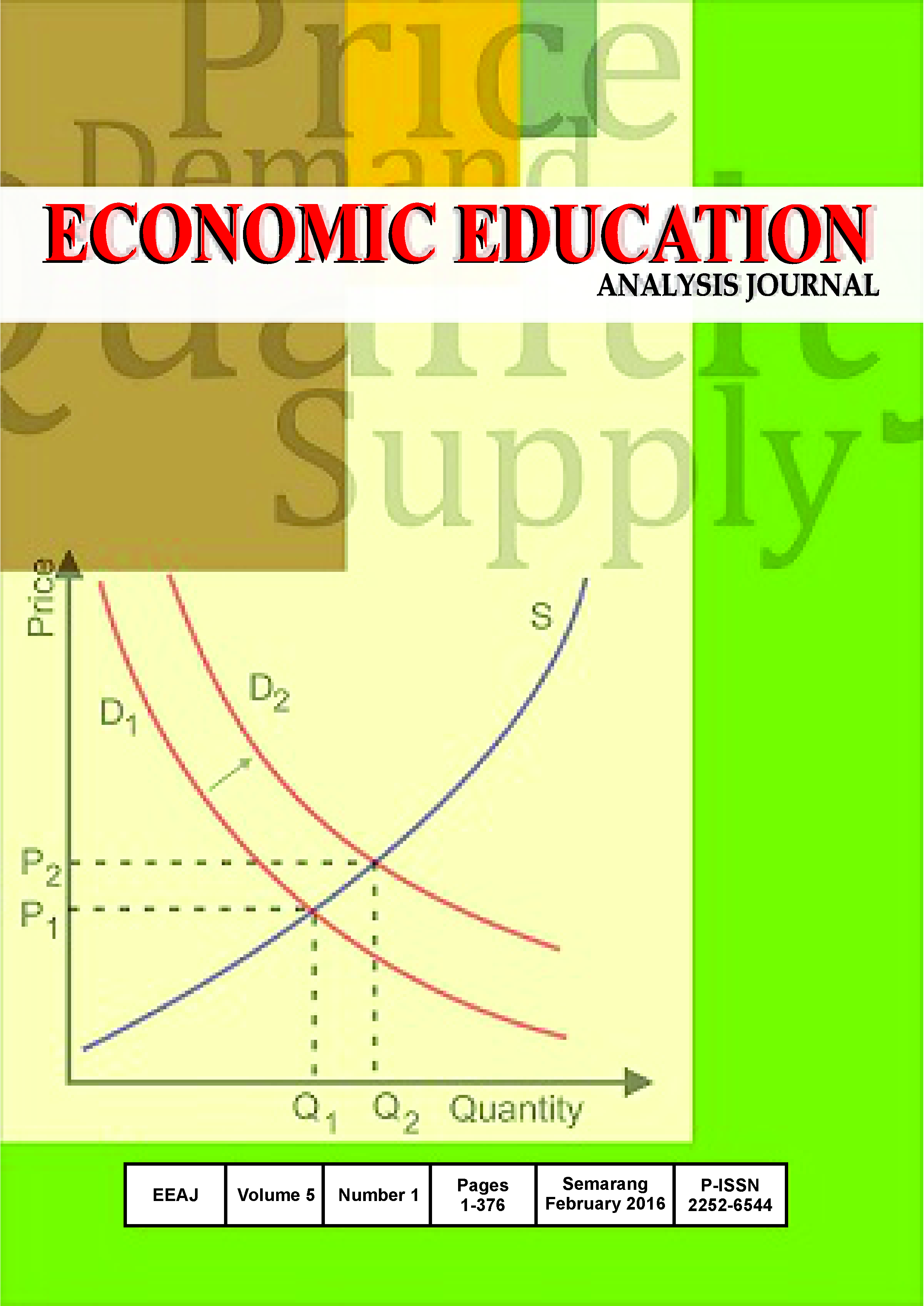PENGARUH PENDIDIKAN KEWIRAUSAHAAN, LINGKUNGAN KELUARGA, DAN SELF EFFICACY TERHADAP MINAT BERWIRAUSAHA SISWA SMK PROGRAM KEAHLIAN AKUNTANSI
Main Article Content
Abstract
Tujuan dari penelitian ini adalah untuk mengetahui apakah ada pengaruh positif secara simultan maupun parsial pendidikan kewirausahaan, lingkungan keluarga, dan self efficacy terhadap minat berwirausaha siswa kelas XI program keahlian akuntansi di SMK Negeri 9 Semarang tahun ajaran 2014/2015. Subjek penelitian ini adalah siswa kelas XI program keahlian akuntansi di SMK Negeri 9 Semarang tahun ajaran 2014/2015. Sampel yang digunakan adalah seluruh subjek yang ada sebanyak 108 siswa. Variabel dependen dalam peneltian ini ialah minat berwirausaha (Y) sedangkan variabel independennya meliputi pendidikan kewirausahaan (X1), lingkungan keluarga (X2), dan self efficacy (X3). Metode pengumpulan data menggunakan angket. Teknik analisis data menggunakan analisis statistik deskriptif, analisis regresi berganda, uji F, uji t, dan koefisien determinasi simultan (R2). Hasil penelitian menunjukan pendidikan kewirausahaan, lingkungan keluarga dan self efficacy berpengaruh positif terhadap minat berwirausaha. Pendidikan kewirausahaan, lingkungan keluarga dan self efficacyberpengaruh 54,4% secara simultan. Pendidikan kewirausahaan berpengaruh 6,05%, lingkungan keluarga berpengaruh 12,82%, dan self efficacyberpengaruh 16,81% secara parsial. Saran yang diberikan sekolahdiharapakan lebih memberikan pengetahuan dan nilai-nilai kewirausahaan,keluarga diharapkan dapat memberikan dukungan terhadap pilihan karir berwirausaha sebagai alternatif pilihan karir kelak dan guru diharapakan dapat meyakinkan siswa bahwa mereka mampu menyelesaikan tugas-tugas kewirausahaan yang diberikan agar siswa semakin yakin akan kemampuan yang dimilikinya.
The purpose of this study was to determine whether there was an positive simultaneously effect and partially the result of entrepreneurial education, family environment, and self efficacy to interest in entrepreneurship for students on program accounting axpertise XI class at State Vocational High School 9 Semarang in the academic year 2014/2015. The subjects were all students of class XI program accounting axpertise at State Vocational High School 9 Semarang in the academic year 2014/2015. The samples are all subjects that there were 108 students. The dependent variable in this study is the interest in entrepreneurship (Y) while the independent variables include entrepreneurship education (X1), the family environment (X2), and self efficacy (X3). Data collection methods were used is questionnaire. Data analysis techniques were using analysis of the descriptive statistical, multiple regression analysis, F test, T Test, and the simultaneous determination coefficient (R2). The results showed that entrepreneurship education, family environment and self efficacy positive effect to interest in entrepreneurship. Entrepreneurship education, family environment and self efficacy simultaneously affect 54,4%. In the entrepreneurship education a positive effect 6.05%. The family environment a positive effect 12.82%, as well as self efficacy positive effect partially 16,81%. The researcher suggests that schools are expected to provide the knowledge and values of entrepreneurship, the family is expected to provide support to entrepreneurship as an alternative career options in the future and the teacher is expected to convince students that they are capable of completing the tasks given entrepreneurship so that students will be more confident of its ability.
Article Details
References
Ajzen, Icek. 1991. “The Theory of Planned Behaviorâ€. Dalam Jurnal Organizational Behavior and Human Decision Processes, Volume 50 No.02. Hal. 179-211. Amherst: University of Massachusetts.
Akanbi, Samuel Toyin. 2013. “Familial Factors, Personality Traits and Self Efficacy as Determinants of Entrepreneurial Intention among Vocational Based Colege of Education Students in Oyo State, Nigeriaâ€. DalamJurnal African Symposium, Volume 13 No.02. Hal.66-76. Nigeria: Oyo State.
Alma, Buchari. 2011. “Kewirausahaanâ€. Bandung: Alfabeta.
-----------------. 2013. “Kewirausahaan untuk Mahasiswa dan Umumâ€. Edisi 2. Bandung: Penerbit Alfabeta.
Badan Pusat Statistik. 2015. “Pengangguran Terbuka Menurut Pendidikan Tertinggi yang Ditamatkan 2012-2014â€.http://www.bps.go.id/tab_sub/view.php?kat=1&tabel=1&daftar=1&id_subyek=06¬ab=4. (8 Februari 2015 Pukul 17.00 WIB).
Bandura. 1997. “Self Efficacy The Exercise of Controlâ€. New York: W.H Free and Company.
Ekpoh,Uduak Imo dan Aniefiok Oswald Edet. 2011. “Entrepreneurship Education and Career Intentions of Tertiary Education Students in AKwa Ibom and Cross River States, Nigeriaâ€. Dalam Jurnal International Education Studies, Volume 04 No.01. Hal.172-178. Nigeria: University of Calabar.
Fu’adi, Isky Fadli. 2009. “Hubungan Minat Berwirausaha dengan Prestasi Praktik Kerja Industri Siswa Kelas XII Teknik Otomotif SMK Negeri 1 Adiwerna Kabupaten Tegal Tahun Ajaran 2008/2009â€. Dalam Jurnal Pendidikan Teknik Mesin (PTM), Volume 09 No. 02. Hal. 92-98. Semarang: Universitas Negeri Semarang.
Feist, Gregory J dan Jess Feist 2008. “Theories of Personalityâ€. Yogyakarta: Pustaka Pelajar.
Ghozali, Imam. 2011. “Aplikasi Analisis Multivariate dengan Program IMB SPSS 19â€. Semarang: Badan Penerbit Universitas Diponegoro.
Hurlock, B. Elizabeth . 1978. “Perkembangan anakâ€. Jakarta: Penerbit Erlangga.
Indratno, A. Ferry. 2012. Membentuk Jiwa Wirausaha. Jakarta: Kompas.
Indarti, Nurul. 2008. “Intensi Kewirausahaan Mahasiswa: Studi Perbandingan antara Indonesia, Jepang dan Norwegiaâ€. Dalam Jurnal Ekonomika dan Bisnis Indonesia, Volume 23 No.04. Hal. 1-27. Yogyakarta: Universitas Gajah Mada
Kementrian Pendidikan Nasional dan Badan Penelitian dan Pengembangan Kurikulum. 2010. “Pengembangan Pendidikan Kewirausahaanâ€. Jakarta: Kementrian Pendidikan Nasional.
Koranti, Komsi. 2013. “Analisis Pengaruh Faktor Eksternal dan Iternal Terhadap Minat Berwirausahaâ€. Dalam Proceeding PESAT (Psikologi, Ekonomi,Sastra, Arsitektur & Teknik Sipil, Volume 05 No. 05. Hal. E1-E8. Bandung: Universitas Gunadarma.
Lestari, Retno Budi dan Trisnadi Wijaya. 2012. “Pengaruh Pendidikan Kewirausahaan terhadap Minat Berwirausaha Mahasiswa di STIE MDP, STMIK MDP, dan STIE MUSIâ€. Dalam Jurnal Ilmiah STIE MDP, Volume 01 No.02. Hal.112-119. STIE MDP.
Marini, Chomzana Kinta dan Siti Hamidah. 2014. “Pengaruh Self Efficacy, Lingkungan Keluarga dan Lingkungan Sekolah terhadap Minat Berwirausaha Siswa SMK Jasa Bogaâ€. Dalam Jurnal Pendidikan Vokasi, Volume 04 No.02. Hal.195-207. Yogyakarta: UNY.
Sobur, Alex. 2003. “Psikologi Umumâ€. Bandung: Pustaka Setia.
Soemanto, Wasty. 2008. “Pendidikan Wiraswastaâ€. Jakarta: Bumi Aksara.
Sutanto, Adi. 2002. Kewiraswastaan. Jakarta: Ghalia Indonesia.
Undang-Undang RI Nomor 20 Tahun 2003 tentang Sistem Pendidikan Nasional.
